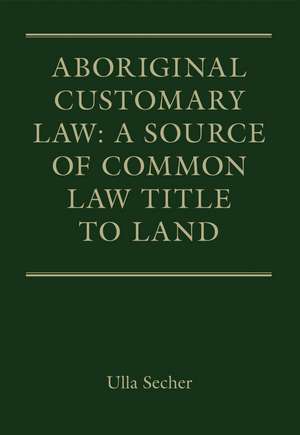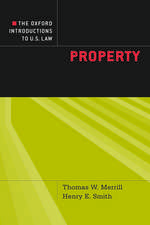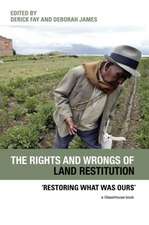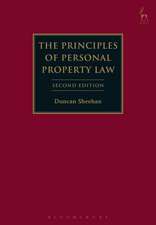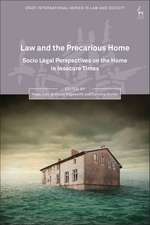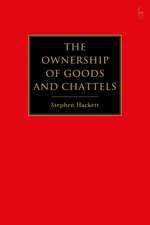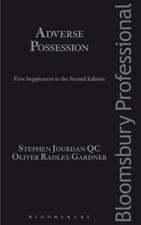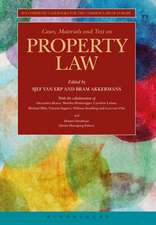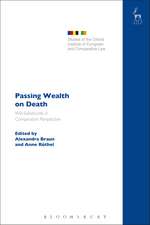Aboriginal Customary Law: A Source of Common Law Title to Land
Autor Dr Ulla Secheren Limba Engleză Hardback – 5 mar 2014
Preț: 900.49 lei
Preț vechi: 1288.25 lei
-30% Nou
Puncte Express: 1351
Preț estimativ în valută:
172.33€ • 187.12$ • 144.76£
172.33€ • 187.12$ • 144.76£
Carte disponibilă
Livrare economică 01-15 aprilie
Preluare comenzi: 021 569.72.76
Specificații
ISBN-13: 9781849465533
ISBN-10: 1849465533
Pagini: 534
Dimensiuni: 156 x 234 x 18 mm
Greutate: 1.07 kg
Ediția:New.
Editura: Bloomsbury Publishing
Colecția Hart Publishing
Locul publicării:London, United Kingdom
ISBN-10: 1849465533
Pagini: 534
Dimensiuni: 156 x 234 x 18 mm
Greutate: 1.07 kg
Ediția:New.
Editura: Bloomsbury Publishing
Colecția Hart Publishing
Locul publicării:London, United Kingdom
Caracteristici
The author explains that Aboriginal customary law can be a source of common law title to land in former British colonies, whether they were acquired by settlement or by conquest or cession from another colonising power.
Notă biografică
Ulla Secher is a Visiting Fellow with the Faculty of Law at the University of New South Wales, Sydney, Australia. She was admitted as a Barrister of the Supreme Court of Queensland in 1998.
Cuprins
Introduction Part I: Australian Land Law and the Meaning of Radical Title Pre-Mabo Chapter One: The Origin and Application of the Doctrine of Absolute Crown Ownership in Australia: The Common Law 1788-1992 I The Feudal Basis of Land Law in England II The Reception of Land Law into the Australian Colonies III Conclusion Chapter Two: The Meaning of Radical Title Pre-Mabo I The Meaning of Radical Title: The Leading Privy Council Authorities (Re)Examined II International v Municipal Law: American Authority III New Zealand Authority IV Conclusion Part II: The Doctrine of Tenure and the Juridical Consequences of the Colonial Law Classification of an 'Inhabited' Colony as 'Settled' Re-examined Post-Mabo Chapter Three: The Doctrine of Tenure and the Common Law Consequences of the Classification of an 'Inhabited' Colony as 'Settled' Post-Mabo: Emergence of the Doctrine of Tenure ad Veritatem and the Doctrine of Continuity Pro-Tempore I Radical Title as the Postulate of the Doctrine of Tenure ad Veritatem II The Reception of Land Law into the Australian Colonies Revisited III Post-Mabo Developments IV Conclusion Part III: The Meaning of Radical Title in Post-Mabo Australian Jurisprudence Chapter Four: Radical Title and Unalienated Land Post-Mabo I Automatic Expansion of Radical Title in Respect of Original Unalienated Land: Brennan J's Reliance on the 'No Other Proprietor' Principle (Radical Title as a Concomitant of Sovereignty) II Automatic Expansion of Radical Title in Respect of Currently Unalienated Land: Brennan J's 'Reversion Expectant' Argument (Radical Title as Both the Postulate of the Doctrine of Tenure and a Concomitant of Sovereignty) III Extinguishment of Native Title by Crown Grant IV Native Title Legislation: Implications for Property Rights to Currently Unalienated Land V Conclusion Chapter Five: Radical Title: Lessons from the Sea I The Crown's Title to the Territorial Seabed and Beyond: The Position Before Mabo II The Crown's Title to the Territorial Seabed and Beyond Post-Mabo: WMC and YarmirrFC III Summary IV Yarmirr: The High Court V Post-Yarmirr Developments VI Conclusion Part IV: The Practical Implications of the Crown's Radical Title Chapter Six: Crown Acquisition of a Plenary Title: The Common Law Record Requirement and Statutory Regimes Regulating the Alienation of Land I Occupancy as a Basis of Original Crown Ownership II The Record Requirement III Crown Land Statutes: Statutory Definition of 'Crown Land' IV Legislative Provisions Dealing with the Power to Legislate Regarding Crown Land V Conclusion Chapter Seven: The Doctrine of Common Law Aboriginal Customary Title in Australia and Implications for South Africa I Aboriginal Customary Law: A Source of Non-Derivative Common Law Title to Land II First Limb of the Doctrine of Common Law Aboriginal Customary Title: Title Arising After Acquisition of Sovereignty III Second Limb of the Doctrine of Common Law Aboriginal Customary Title: Title Arising Before Acquisition of Sovereignty IV Doctrinal Underpinnings for Aboriginal Customary Title V Aboriginal Customary Law as a Source of Non-Derivative Common Law Title to Land in Ceded and Conquered Colonies: South Africa Post-Richtersveld VI Conclusion Chapter Eight: Canada: Application and Implications of the Doctrine of Common Law Aboriginal Customary Title I The Reception of Law in Canada: the Constitutional Status of the Canadian Provinces and Territories Reconsidered II The Doctrine of Tenure, Radical Title and Aboriginal Land Rights in Canada III Bipartite Colonial Contexts - Quebec and Aboriginal Title IV Conclusion Conclusions
Recenzii
the author has done an impressive job at articulating her thesis in a straightforward yet sophisticated style. Her comprehensive re-evaluation of relevant case law and her analysis of Mabo shows a depth of knowledge which flows through the entire book. Her meticulous research and attention to detail is clearly evident.Reading this book is well worth the effort; the reader will come away with a new perspective on Mabo, and a fresh outlook on the future of Indigenous land rights. I would agree with Kent McNeil's description in the foreword that it is 'a formidable contribution'.
Descriere
Described as "ground-breaking" in Kent McNeil's Foreword, this book develops an alternative approach to conventional Aboriginal title doctrine.
